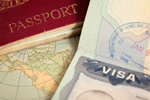Avoiding financial hassle during and after emigration

Avoiding financial hassle during and after emigration
For expats, there’s a huge emphasis on getting used to a new culture, a new language and a new workplace or way of life, but newly arrived expatriates should take care they don’t ignore their finances. Dealing with financial matters once the home country is just a memory takes self-discipline and concentration, but is as important as all the other aspects of settling in. Many would-be expats don’t realise financial planning starts with thorough research on the chosen destination’s cost of living versus expected wages, pensions and other benefits, and underestimating the cost of everyday life can result in unpleasant shocks.
Leaving an open bank account in the home country is getting harder, especially if you’re a Briton, as onshore banks are now refusing new accounts to those emigrating and even cancelling existing accounts once their clients are resident overseas. If it’s at all possible, getting or keeping a home country account should be done, especially if returning home is on the cards some time in the far future. It’s necessary but annoying to have to advise your credit card provider you’re moving overseas, but cancellation is a possibility if you don’t declare your move until you’re found out! An offshore bank account complete with card is advisable, making bill payments straightforward by means of simple online transfers.
Factoring in the exchange rate between your home currency and that in use in your expat location can be a bore, especially if math isn’t your best subject, but can save money if taken seriously before making large transfers. Getting a fixed rate for a period of at least six months or a year is an idea, especially for Brits moving overseas before Brexit. Trying to save money by opting for less than generous health and other insurances can be a mistake, as accidents do happen and everyone gets old sooner rather than later. If you already have such insurances, check if they’re valid overseas as many aren’t.
Ignoring tax requirements is a big mistake, especially if you’re a US citizen. Expats on company reassignments should have help with their tax forms, but different countries have different laws which must be taken into account sooner rather than later. Taking hard copies as well as your original birth, marriage, divorce, graduation and other certificated documentation proving who you are and what you know can be very useful as a backup in emergencies. Electronic copies save time and trouble if they’re required. Also important are visa renewal, banking, pension, tax filing and other such documents which may be needed in the future.
Related Stories:
- Expats in Caymans Islands financial and tourism sectors leaving in droves - April 6, 2020
- Recently retired expats to be financially hard hit by market chaos - March 26, 2020
- Brit expats confirm UK weather is a major reason for emigration - March 20, 2020
- Expats warned over financial pitfalls of reassignment to the UAE - March 3, 2020
- Is Hong Kong finished as Asia’s financial hub? - December 23, 2019
- Is research the key to a successful emigration? - September 20, 2019
- Why is emigration such a huge trend in the 21st century? - September 6, 2019
- How to make the best of your financial situation in the UAE - August 13, 2019
- Staying financially stress free as an expat - July 10, 2019
- Avoiding cultural mistakes as an expat in Asia - May 10, 2019
Latest News:
- Tips on a trouble-free relocation as an expat overseas - July 20, 2020
- Expats find peace in the covid-19 refuge of Dahab town - July 20, 2020
- Is Kuwaitization the unintended result of the oil price crash? - July 20, 2020
- Expats unhappy abut changes to Korean points-based visa system - July 17, 2020
- Chiang Mai and Bangkok no longer bargain locations for expats - July 17, 2020
- Expats in Malaysia still banned from overseas travel - July 17, 2020
- Vietnam welcomes expats to its safe, affordable lifestyle - July 16, 2020
- Asian tiger economies reach out to expats in Hong Kong - July 16, 2020
- HSBC Asia to cut back on internal expat relocations - July 16, 2020
- Tips on integrating for newly-arrived expats - July 15, 2020


